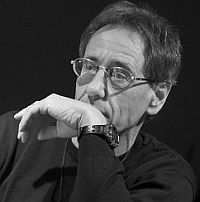
However, he is essentially still a composer and would like to have the time to compose. Early 2011 he moved to Vienna, proceeding from the contemporary music desert of Carinthia into the lively jungle of Vienna with musical plants of various kinds. Bruno Strobl now eagerly observes these plants, attends concerts, searches for exchange with composers, musicians, improvisers. A lot has become possible that was impossible in this intensity for many years, due to the place of his residence and the right circumstances. Festival visits during the week? Impossible, not even as an educational leave for a music teacher.
Bruno Strobl was rather late in fulfilling his wish to become a composer. He first took private lessons with Nicholas Fheodoroff at the age of 30, and then studied composition with Dieter Kaufmann. In the late 1980s he became interested in working with overtones. At that time the music of spectralists was still unknown to him. His compositional thinking involved microtonality, but not as a basis, rather as an ingredient. Various partial tone series served as his foundation for the organization, while adapting microtonal deviations, formative of the natural overtone series and of the tempered scale. The result is not a decidedly microtonal music, even if Stobl repeatedly used microtonality and integrated it in various works.
His compositions are often characterized by transitions, which he likes to describe as the shape of a wave – a seemingly basic form defining countless scores. Possible changes, irritability, breaks, transformations, reversals, reflections are what interest Strobl, not the constant repetition of a basic form. When applied to structural and tonal developments and processes, Strobl’s music is always in flux. This integrated combination and exchange of abstract sound creations, or seemingly resting, intimate and delicate nuances, iridescent passages on the one hand and on the other hand sections with partly high expressivity, sometimes induced by traditional gestures, sometimes as a reference, then again as a counterpoint or an irritation, are part of this wave concept. Expressivity and sparingness, also and because of the implemented musical means, manifests itself not only as a counterpoint, but as interlocked.
Bruno Strobl has a special fondness for the human voice, which he almost always implements as a traditional singing voice, integrates it into his creative concept, or even overlays it. It is not only the voice that he is interested in, but also lyrics – whether as a song, in music theater or as a stage music writer for theater productions of the “Neue Bühne Villach”. One of his most recent works is the church opera “Sara und ihre Männer”, which celebrated its premiere in July at the Abbey Church Ossiach in Carinthia.
Nina Polaschegg
translated from German
Photo: Patrick Connor Klopf
https://db.musicaustria.at/en/node/65634
